|
|
|
Sort Order |
|
|
|
Items / Page
|
|
|
|
|
|
|
| Srl | Item |
| 1 |
ID:
131984
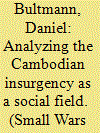

|
|
|
|
|
| Publication |
2014.
|
| Summary/Abstract |
This article investigates power practices in the Cambodian insurgency after 1979 as being part of a social field. There are various types of power practice being exercised by commanders aiming at making soldiers disciplined inside the insurgency. The hypothesis explaining these variations being proposed here is that the type of power being exercised depends on the habitus of the respective commander. Power practices are shaped by the incorporated classificatory discourse of commanders on good soldierhood and leadership. Thereby, armed groups can be analyzed as a social field in which practices are always relational and part of symbolic struggles between different commanders.
|
|
|
|
|
|
|
|
|
|
|
|
|
|
|
|
| 2 |
ID:
144852
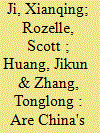

|
|
|
|
|
| Summary/Abstract |
China's agricultural sector faces challenges because most farms are still small scale. China's policy is to encourage the consolidation of farms and promote farms that are larger in scale. A question that arises is: Are China's farms growing? The goal of the present paper is to determine whether large farms in China have emerged or if farms remain small. To meet this goal, we systematically document the trends in the operational sizes of China's farms and measure the determinants of changes in farm size. Using a nationally representative dataset, the study shows that in 2013 China's farming sector was still mostly characterized by small-scale farms. However, at the same time, there is an emerging class of middle-sized and larger-sized farms. Most large farms are being run by households but there is a set of large farms that are company/cooperative-run. Today, farmers on larger farms are younger and better educated than the average farmer.
|
|
|
|
|
|
|
|
|
|
|
|
|
|
|
|
| 3 |
ID:
131843


|
|
|
|
|
| Publication |
2014.
|
| Summary/Abstract |
As relations between Japan and China change due to a paradigm shift that has occurred over the past few years, the need for a new security outlook and world view has emerged. In East Asia, the foundation for the relationship between Japan and China must be fairness and justice, and the rule of law. This article proposes ways that Japan and China can work to cultivate common ground that would bring forth the possibility of a new Japan-China relationship based on the "strategic reciprocal relationship" established in 2006.
|
|
|
|
|
|
|
|
|
|
|
|
|
|
|
|
| 4 |
ID:
132961
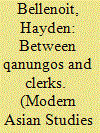

|
|
|
|
|
| Publication |
2014.
|
| Summary/Abstract |
This paper argues that our understanding of the transition to colonialism in South Asia can be enriched by examining the formation of revenue collection systems in north India between 1750 and 1850. It examines agrarian revenue systems not through the prism of legalism or landholding patterns, but by looking at the paper and record-based mechanisms by which wealth was actually extracted from India's hinterlands. It also examines the Kayastha pensmen who became an exponentially significant component of an Indo-Muslim revenue administration. They assisted the extension of Mughal revenue collection capabilities as qanungos (registrars) and patwaris (accountants). The intensity of revenue assessment, extraction and collection had increased by the mid 1700s, through the extension of cultivation and assessment by regional Indian kingdoms. The East India Company, in its agrarian revenue settlements in north India, utilized this extant revenue culture to push through savage revenue demands. These Kayastha pensmen thus furnished the 'young' Company with the crucial skills, physical records, and legitimacy to garner the agrarian wealth which would fund Britain's Indian empire. These more regular patterns of paper-oriented administration engendered a process of 'bureaucratization' and the emergence of the modern colonial state.
|
|
|
|
|
|
|
|
|
|
|
|
|
|
|
|
| 5 |
ID:
132953
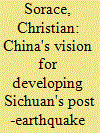

|
|
|
|
|
| Publication |
2014.
|
| Summary/Abstract |
In the aftermath of the 2008 Wenchuan earthquake, government officials, scholars and outside observers eagerly hoped that the emergency relief and reconstruction process would bring about the emergence of civil society and increase grassroots democratic participation. Contrary to this optimistic assessment, this article contends that the local state used the opportunity of the disaster as an experimental laboratory to implement an array of already existing national development plans. The urgency with which the reconstruction was to be completed and the opportunities to meet national development targets as well as access reconstruction funds were too tempting to resist. However, the ham-fisted Leninist implementation style met with local resistance and has contributed to a significant deterioration in local state-society relations. The fact that many local residents continue to question why, despite the huge resources invested by the state in the reconstruction project, they have yet to see any improvement in their economic and overall living conditions points to a deficit of local participation and a breakdown in political communication and trust. By focusing on the different political economies of disaster reconstruction, this article attempts to illuminate the regime's vision for developing the countryside, rural politics, and state-society relations in China more broadly. Unless the state is able to incorporate local needs into its development plans, it will not win the trust and support of local residents, regardless of the amount of money it invests or the benevolence of its intentions.
|
|
|
|
|
|
|
|
|
|
|
|
|
|
|
|
| 6 |
ID:
131466
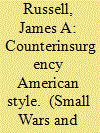

|
|
|
|
|
| Publication |
2014.
|
| Summary/Abstract |
This article examines the complex legacy of David Petraeus who was a key figure in the emergence of the US military shift towards counterinsurgency doctrine in the years after 2006. Although Petraeus has been perceived by critics as a publicity seeker, he can be credited with laying the foundations for a more serious commitment to COIN involving in particular in integrating conventional and Special Forces in arenas like village stability operations. The article looks a Petraeus's role in both Iraq and Afghanistan: it concludes that, in the case of Afghanistan, it is too early to assess whether counterinsurgency has had a decisive impact of the outcome of the war against the Taliban.
|
|
|
|
|
|
|
|
|
|
|
|
|
|
|
|
| 7 |
ID:
124516
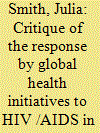

|
|
|
|
|
| Publication |
2013.
|
| Summary/Abstract |
This article provides a critical perspective on global health initiatives (GHIs) in response to HIV/AIDS in post-conflict African countries. Focusing on the Global Fund to Fight HIV/AIDS, Tuberculosis and Malaria, the President's Emergency Plan for AIDS Relief and UN bodies, it argues that many global health initiatives lack consideration of the complexities of addressing HIV/AIDS in post-conflict contexts. It finds that prevention programmes fail to prioritize the population groups who are at high risk; that treatment and care interventions are shaped by an emergency aid paradigm, which does not ensure ongoing well-being for people living with HIV/AIDS; and that global health initiatives often impede the capacity of local governance and health systems. Given that global health initiatives have yet to fully engage with the challenges of implementing HIV/AIDS interventions in conflict-affected African contexts, the article concludes by proposing recommendations in this regard.
|
|
|
|
|
|
|
|
|
|
|
|
|
|
|
|
| 8 |
ID:
130942
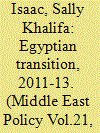

|
|
|
|
|
| Publication |
2014.
|
| Summary/Abstract |
This paper tackles the political and security complications of the Egyptian transition from its inception in January 2011 until the fall of the Muslim Brotherhood president, Mohamed Morsi, in July 2013, with a primary focus on how these complications are of strategic importance to Europe. It starts with inferring Egypt's role in European Union (EU) approaches to security in the Mediterranean, which were acknowledged in the 2003 European Security Strategy and then largely interpreted in the 2004 European Neighborhood Policy. It argues that the old EU democracy-stability dilemma persisted in Europe's approach to the Egyptian transition, especially during Morsi's one-year presidency. In discussing the current political and security complications of the Egyptian transition and how they constitute strategic concerns to Europe, the analysis tackles undermined social cohesion in Egypt due to processes of repolarization in Egyptian society after July 2013; the question of Egypt's porous borders with the Hamas-controlled Gaza Strip; the emergence of the Sinai Peninsula as a jihadist center; and the rising importance of economics in the EU-Egyptian relationship
|
|
|
|
|
|
|
|
|
|
|
|
|
|
|
|
| 9 |
ID:
124462


|
|
|
|
|
| Publication |
2013.
|
| Summary/Abstract |
The 1960s in Afghanistan's history were marked by the emergence of a number of political parties, from monarchist to radical left and right. They played an important role in the social, cultural and political dynamics of the time and even the future of the country. This paper explores how political parties emerged in a country which was characterized as a tribal-peasant society with only a very small number of educated people. It also discusses why the monarch would not sign the Political Parties' Bill and how this influenced Afghanistan's political culture and led to the radicalization of the political parties. In addition, it examines how the anti-government and radical political parties managed to mobilize people and dominate the political scene while the pro-government and nationalist parties had little influence.
|
|
|
|
|
|
|
|
|
|
|
|
|
|
|
|
| 10 |
ID:
165016
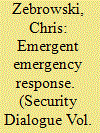

|
|
|
|
|
| Summary/Abstract |
Emergency responses are premised on the hope that, even when events cannot be wholly predicted and prevented, timely action in the present can be exercised to strip an emergent event of its disruptive potential. Yet, while the speed of emergency responses plays a critical role in underpinning UK resilience, it has been a relatively neglected subject in studies of resilience advanced through the paradigm of preparedness. This article aims to contribute to and extend work in the field of emergency governance by arguing that concerns surrounding the speed of response contribute to a distinct form of security enacted in contemporary emergency response strategies, which I term ‘event suppression’. Drawing on policy analysis, preparedness exercise observations and practitioner interviews, this article investigates how speed operates as a core problematic informing the design of UK emergency responses, organized through the Integrated Emergency Management framework. Integrated Emergency Management promises to accelerate emergency response operations by utilizing advances in communications technologies to drive the bottom-up emergent self-organization of emergency responses. Event suppression ensures security not by preventing an event from happening, but by quickly closing down the ‘disruptive’ time of the emergency event and restoring the linear historical time of standard political processes.
|
|
|
|
|
|
|
|
|
|
|
|
|
|
|
|
| 11 |
ID:
086753
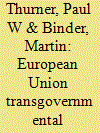

|
|
|
|
|
| Publication |
2009.
|
| Summary/Abstract |
Does the European Union (EU) represent a new political order replacing the old nation-states? The assessment of the real character of political orders requires the identification of political key actors and of the specific structure of their interactions. Transgovernmental networks have been considered to be one of the most important features of EU integration. Unfortunately, the network structures, processes and the impact of these informal horizontal inter-organisational relations between nation-states are mostly unknown. The main objective of this article is to measure and explain the selective pattern of informal bilateral relations of high officials of the EU Member States' ministerial bureaucracies on the occasion of an EU Intergovernmental Conference. The quantitative data used rely on standardised interviews with 140 top-level bureaucrats. The statistical estimation of network choices is based on recent developments of exponential random graph models.
|
|
|
|
|
|
|
|
|
|
|
|
|
|
|
|
| 12 |
ID:
131329
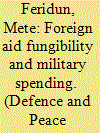

|
|
|
|
|
| Publication |
2014.
|
| Summary/Abstract |
The present article examines if the foreign aid to North Cyprus is fungible and if it is in a long-run equilibrium relationship with military spending using the Autoregressive Distributed Lag bounds testing procedure from 1977 to 2007. The results suggest that neither tax revenues nor public expenditures are in a long-run equilibrium relationship with foreign aid. However, strong evidence emerges that defence expenditures are in a long-run equilibrium relationship with foreign aid, and that the latter seem to cause the former.
|
|
|
|
|
|
|
|
|
|
|
|
|
|
|
|
| 13 |
ID:
172119


|
|
|
|
|
| Summary/Abstract |
Over the years, this author has been involved in the ‘Chinese school of International Relations (IR)’ debate. In this article I try to reflect on these discussions or debates from which some insights can be retrieved to inform future research and further growth of a Chinese School of IR. Should a Chinese school be set as the goal? If so, how should this be pursued? This debate and the relevant efforts have proved to be a promising movement in the Chinese IR community, demonstrating that a Chinese school of IR is inevitable and it actually is evolving. A theory is a generalization or cluster of generalizations. This article argues that from the ‘Tsinghua approach’, a ‘moral realism’ has sprung up. Qin Yaqin’s theorizing is centered around relationality and has been productive. A theory of symbiosis in the world community is being developed by a group of Shanghai-based scholars, and a ‘symbiosis school’ has grown up. Overall, four distinct theories of Chinese origins, i.e., relational theory, moral realism, tianxia theory and gongsheng/symbiotic theory, have appeared. Thus, IR theory-building in China in the first two decades of the 21st century has rendered the question ‘why there is no IR theory in China’ obsolete.
|
|
|
|
|
|
|
|
|
|
|
|
|
|
|
|
| 14 |
ID:
124514
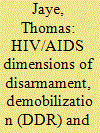

|
|
|
|
|
| Publication |
2013.
|
| Summary/Abstract |
Countries emerging from conflict situations face enormous social, economic, security and political challenges. Contemporary conflicts tend to lead to state and societal collapse, and are characterized by sexual violence and the destruction of fragile economies. Ensuring a safe and secure post-conflict environment for the pursuit of normal life is integral to post-war reconstruction and development processes, and post-conflict environments offer entry points for addressing both the origins and the effects of wars. Accordingly, this article argues that disarmament, demobilization and reintegration (DDR), and security sector reform (SSR), provide important opportunities for incorporating HIV/AIDS issues into broader national security frameworks. Further, the article argues that securitizing HIV/AIDS can ensure that responses to the epidemic are prioritized, but also that the treatment of security personnel should not be privileged over treatment of those who are infected in the larger population.
|
|
|
|
|
|
|
|
|
|
|
|
|
|
|
|
| 15 |
ID:
156882
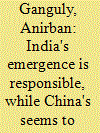

|
|
|
| 16 |
ID:
132214
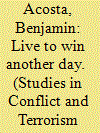

|
|
|
|
|
| Publication |
2014.
|
| Summary/Abstract |
Militant organizations pursue two common aims: to survive and to achieve the goals that define their raison d'être. Yet, elements that sustain the life spans of militant organizations are not necessarily the same components that advance the accomplishment of their core, or "outcome," goals. Further, some organizational practices, such as the use of suicide attacks, generate a tradeoff that bolsters survivability while detracting from the effective pursuit of outcome goals. This study demonstrates that three operating conditions explain variation in the duration and achievement of contemporary militant organizations: receptiveness to tradeoffs, levels of external support, and the nature of adversaries. As such, the unique effects of different operating conditions reveal why many militant organizations survive for long periods of time but only a few achieve the goals that justify their existence.
|
|
|
|
|
|
|
|
|
|
|
|
|
|
|
|
| 17 |
ID:
144364
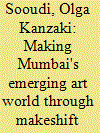

|
|
|
|
|
| Summary/Abstract |
India's art world has garnered significant attention as an ‘emerging art world’, but we know little about how such worlds emerge and are experienced by those working within them. This article explores this question of ‘emergence’ through an ethnography of the Mumbai art world. Gallerists, artists and other insiders generally perceive local conditions as insufficient and in-the-making. They juxtapose Mumbai against idealised, more established art worlds, and engage in creative, improvised ‘makeshift’ practices to remedy the limitations they see. Despite their provisional nature, these makeshift practices produce new spaces, networks and mediators in the Mumbai art world: in other words, art worlds emerge through practice.
|
|
|
|
|
|
|
|
|
|
|
|
|
|
|
|
| 18 |
ID:
132881
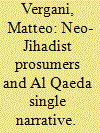

|
|
|
|
|
| Publication |
2014.
|
| Summary/Abstract |
Scholars in the field of terrorism and violent extremism often refer to the so-called Al Qaeda single narrative. This article suggests that the Internet challenges the existence of a "single narrative," by arguing that neo-jihadist prosumers may reinterpret Al Qaeda's narrative and create hybrid symbols and identities. The article discusses the case study of an Italian neo-jihadist allegedly killed in Syria, Giuliano Delnevo, presenting research on his YouTube and Facebook production. Delnevo's narrative, which emerges from the diverse messages circulating on the Internet, recasts the Al Qaeda narrative by hybridizing it with other cultural backgrounds and political symbols.
|
|
|
|
|
|
|
|
|
|
|
|
|
|
|
|
| 19 |
ID:
091018


|
|
|
|
|
| Publication |
2009.
|
| Summary/Abstract |
Providing an overview of the emergence, characteristics, trajectory, and potential limitations of the transnational anti-base network, this article focuses on two broad questions relevant to transnational politics. First, what processes and mechanisms enabled local and transnational activists to form the international No Bases network? Second, how did activists juxtapose existing local anti-base identity and frames to emerging transnational ones? Following existing transnational movement theories, I argue that the global anti-base network slowly emerged through processes of diffusion and scale shift in its early stages. The onset of the Iraq War, however, injected new life into the transnational anti-base movement, eventually leading to the inaugural International Conference for the Abolition of Foreign Bases in 2007. Although loose transnational ties existed among anti-base activists prior to 2003, the U.S. war in Iraq presented anti-base activists the global frames necessary to accelerate the pace of diffusion, scale-shift, and brokerage, and hence, the consolidation of a transnational anti-base network. Paradoxically, however, even as No Bases leaders attempted to forge a new transnational identity, anti-base activists, as "rooted cosmopolitans," continued to anchor their struggle in local initiatives.
|
|
|
|
|
|
|
|
|
|
|
|
|
|
|
|
| 20 |
ID:
123581


|
|
|
|
|
| Publication |
2013.
|
| Summary/Abstract |
While some theorists in International Relations have engaged with thinking about complexity, we would argue that few have thought it through to its logical conclusion - the interconnectedness of systems, and the implications for agency and structure. This article examines the structure-agency question using the framework of 'posthuman international relations', which draws on recent thinking in complexity and argues for an approach to the study of global politics that is post-Newtonian and non-anthropocentric. Key elements of a complexity-based approach are examined, and it is argued that these provide a novel way of considering issues of agency and structure. They also raise issues for the analysis of agency and the link between actions and outcomes. Complex systems can present problems of analysis related to unpredictability, causality and non-linearity. Having laid out a framework for thinking about action and context in international politics, the article turns to questions of agency and practice within complex systems. Perhaps the most significant claim here is that it is possible to conceive of agency beyond the human. Drawing upon Margaret Archer's discussions of primary and corporate agency, a threefold approach to thinking about structure and agency is developed, which allows us to think about agency beyond the human. Finally, an explanation is given as to why a complex approach to thinking about international relations ultimately implies a posthuman perspective.
|
|
|
|
|
|
|
|
|
|
|
|
|
|
|
|
|
|
|
|
|